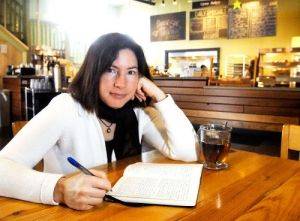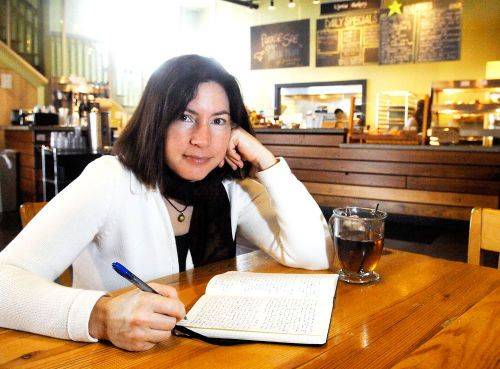On January 24th and 25th, Eastern Illinois University will host its annual Lions in Winter literary festival. The event will bring together writers from various literary disciplines to read, schmooze, and generally celebrate the books, poems, and essays they love.
Smile Politely’s own Caleb Curtiss spoke with the festival’s organizer, Lania Knight.

Smile Politely: Let’s start with the basics, exactly what is Lions In Winter?
Lania Knight: Lions in Winter is a literary festival celebrating established and emerging writers. We are based in the Midwest, but our writers and editors come from near and far to give readings, craft lectures, genre workshops, and to discuss their love of reading and writing. At EIU, we value connection among writers, and we want to help students and local community writers see how interconnected we all are as writers and readers, even in late January, the deepest, coldest time of winter. Our visiting writers this year are Jami Attenberg, Jason Koo, Alissa Nutting, and Ryan Van Meter. Our genre workshops will be led by Daiva Markelis, Adam Prince, Charlotte Pence, and Ruben Quesada. The Editors Panel includes editors from Cream City Review, Quiddity, Crazyhorse, PANK, and Bluestem.
SP: And who typically attends?
Knight: Writers, editors, students, and instructors from Charleston, Champaign, surrounding counties, Chicago, and surrounding states. We welcome attendees from all over, and this year we’ve added affordable on-site accommodations so fest-goers from nearby states who want to stay overnight can enjoy our two-day festival without spending a lot of cash.
SP: The writers you booked this year are pretty impressive, I must say. I recently finished Alissa Nutting’s book, Tampa, and found it to be very deserving of all the press it’s received. I also recently discovered Jason Koo’s poetry, and have really been enjoying it. All in all, a balanced, interesting mix of writers. So I’m interested, what process did you use when booking authors?
 Knight: We start with a list of writers we personally know who would be willing to come to Central Illinois in the middle of the winter. We have amazing creative writing faculty at EIU who have lots of friends, so our initial list is always surprisingly big. From there, we try to invite a range of writers, some who will appeal to younger audience members, such as college and high school students, and some who will appeal to older fest-goers, such as members of the local community and fellow EIU faculty. Also, we always try to cover all three genres with the emerging writers, and then the keynote is a writer in whatever genre we are lucky enough to attract. This year (and last), the keynote is a fiction writer, but that could change in the future.
Knight: We start with a list of writers we personally know who would be willing to come to Central Illinois in the middle of the winter. We have amazing creative writing faculty at EIU who have lots of friends, so our initial list is always surprisingly big. From there, we try to invite a range of writers, some who will appeal to younger audience members, such as college and high school students, and some who will appeal to older fest-goers, such as members of the local community and fellow EIU faculty. Also, we always try to cover all three genres with the emerging writers, and then the keynote is a writer in whatever genre we are lucky enough to attract. This year (and last), the keynote is a fiction writer, but that could change in the future.
SP: The idea of building a roster of readers that appeal to academics and community members alike seems like a daunting one, but you all seem to have pulled it off rather nicely. I think events that attract a cross section of writers from different backgrounds and writerly identities, like Lions in Winter, can really help define a regional literary community. Is that something that you and the other organizers have been cognizant of as Lions moves into this, its seventh year?
Knight: Well, yes and no. I do think we want to affirm community among writers in our region, but we also are very interested in helping local and regional writers see beyond geographical borders… and beyond genre and identity borders, too. We’re all in this together, even though, as writers, most of our work is done in solitude. The Midwest is friendly, and it’s where a lot of great writing takes place, and yes, I think we want local and regional writers to realize they are a part of this very active literary scene happening right now in the Midwest.
SP: And how would you say that the conference grown since its founding in 2008?
Knight: It’s gone from starting as a series of readings given over a period of three weeks by three emerging writers in separate genres to what it is now, a two-day festival that includes readings by a keynote and three emerging writers, intensive workshops, craft lectures, an editor’s panel and a bookfair. In the future, we’d like to add manuscript consultations and bring in more attendees from states bordering Illinois.
SP: That sounds really great. As for this year, is there anything you’re especially excited for?
Knight: I’m especially excited to meet Alissa Nutting and attend her craft workshop, Writing the Confessional. My advanced fiction class (ENG 4763) is reading selections from her book, Unclean Jobs for Women and Girls, and I’m really looking forward to reading her newest book, Tampa, which has gotten great reviews. I’m also excited to see Jason Koo, who is a friend of mine from graduate school. He’s doing great things with Brooklyn Poets in NYC.
Jami’s book, The Middlesteins, has also gotten rave reviews, so I plan to buy her book (at the Bookfair!) in addition to many others. Ryan Van Meter’s book, If You Knew Then What I Know Now, is on my list of must-haves–I love books about queer identity, and, judging by the reviews, his book will be a great read.
SP: Sounds like it’s going to be a really great event. Is there anything else you thinks folks should know?
Knight: Registration is free to all students. Friday and Saturday night readings are free and open to the public. Books will be available for purchase and the authors will be available for signing after their readings.








